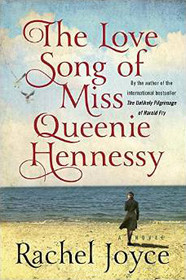The Love Song of Miss Queenie Hennessy by Rachel Joyce tells the other side of the story to Rachel Joyce's debut novel, The Unlikely Pilgrimage of Harold Fry. While the first book was about hope and joy, this is a darker and sadder story of sorrow and regret. Both are beautifully expressed through Rachel Joyce's writing. Having read the first book, I thought I knew how this story ends, but it surprises me nevertheless.
Read my complete review at: http://www.memoriesfrombooks.com/2015/03/the-love-song-of-miss-queenie-hennessy.html
Reviewed based on a publishers galley received through NetGalley
Read my complete review at: http://www.memoriesfrombooks.com/2015/03/the-love-song-of-miss-queenie-hennessy.html
Reviewed based on a publishers galley received through NetGalley
R E K. (bigstone) - , reviewed The Love Song of Miss Queenie Hennessy (Harold Fry, Bk 2) on + 1458 more book reviews
This is a read that touches the heart and makes the end of life more endurable. If you've read The Unlikely Pilgrimage of Harold Fry you will probably enjoy this novel. It's the flip side of the story. Queenie tells her tale, a story of love for a married man who doesn't know how she feels, a story of waiting for him to say goodbye, and a story of dying slowly in a hospice. I found the tale sensitive and emotional.
The caretakers in the hospice where Queenie waits for death are outstanding, listening with patience and kindness. No matter how ill, angry and/or withdrawn a patient may be they listen with understanding. This is a place that is alive with laughter, ideas and thoughts. The residents are like a family and grieve with depth when one of them is lost.
For me, one quote sums the author's intent and belief about dying in a hospice. Sister Mary Iconnou says to Queenie when she is depressed: "Pardon me, but you are here to live until you die. There is a significant difference." It is she who encourages Queenie to write about her life to share with Harold when he arrives. Indeed, the residents are drawn into Harold's journey and wait with excitement for his appearance. It was an uplifting story.
The caretakers in the hospice where Queenie waits for death are outstanding, listening with patience and kindness. No matter how ill, angry and/or withdrawn a patient may be they listen with understanding. This is a place that is alive with laughter, ideas and thoughts. The residents are like a family and grieve with depth when one of them is lost.
For me, one quote sums the author's intent and belief about dying in a hospice. Sister Mary Iconnou says to Queenie when she is depressed: "Pardon me, but you are here to live until you die. There is a significant difference." It is she who encourages Queenie to write about her life to share with Harold when he arrives. Indeed, the residents are drawn into Harold's journey and wait with excitement for his appearance. It was an uplifting story.




